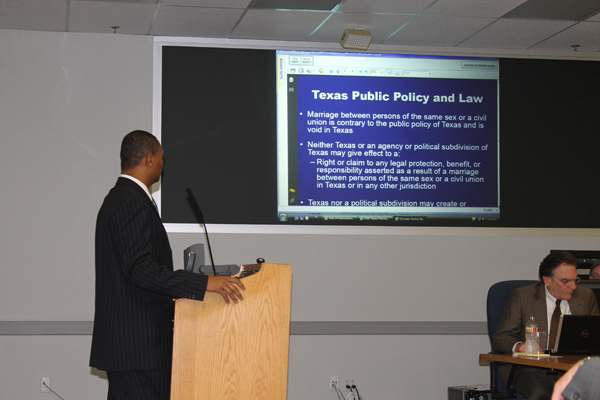
Michael Muhammad, DART’s interim vice president of diversity, briefs DART’s administrative committee on domestic partner benefits on Tuesday. (Anna Waugh/Dallas Voice)
After being briefed on domestic partner benefits Tuesday afternoon, Dallas Area Rapid Transit’s administrative committee requested more information and a formal proposal.
Michael Muhammad, DART’s interim vice president of diversity, presented the presentation, listing the government agencies in Texas that offer DP benefits, as well as a handful of transit agencies in the U.S. that offer them.
Muhammad noted Texas law prohibiting the recognition of anything identical or similar to marriage and said DART’s current benefits policy requires that only a spouse under Texas’ definition can be covered.
He then mentioned that entities that offer DP benefits do so by not limiting the qualifications to only spouses. Cost of offering the benefits for DART was estimated by a consultant at $105,000 to $210,000, but would ultimately be minimal, Muhammad said.
Muhammad gave a less-than-enthusiastic presentation and his demeanor came across as bored while he read from the projected slides.
After the presentation, committee members raised several questions that were not addressed in the presentation, ranging from how many of the agency’s roughly 3,500 employees were single and would possibly use the benefits to what data the consultant analyzed to obtain the estimated cost.
One seemingly offensive comment mentioned Elizabeth Taylor and her many husbands and what DART would do in a situation where someone ended up having many spouses. Muhammad said people could only have one spouse listed and would have to provide proof before adding them.
Committee members requested specific language DART would use in its benefits policy and the data from other Texas cities and counties on how they make employees prove domestic partner status and how much it costs them. Rules and a formal proposal were requested to be presented at the committee’s Nov. 6 meeting.
Rafael McDonnell with Resource Center Dallas, who provided DART with specific cost information for counties and cities who provide DP benefits around the country, said he thought the meeting went well.
“I’m encouraged by the questions from committee members,” he said, adding that they were taking the issue seriously. “They were positive.”
McDonnell also offered to make the presentation at the November meeting, so all questions can be thoroughly answered.
Lesbian activist C.d. Kirven also attended the meeting. She said she was encouraged by the what the members said and that the LGBT community should do “whatever it takes” to persuade DART to offer the benefits, from meeting with individual board members to attending board meetings.











